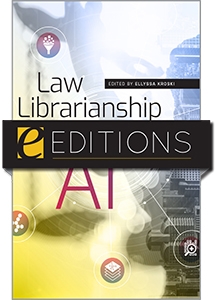
Primary tabs
You don't need to be an ALA Member to purchase from the ALA Store, but you'll be asked to create an online account/profile during checkout to proceed. This Web Account is for both Members and non-Members. Note that your ALA Member discount will be applied at the final step of the checkout process.
If you are Tax-Exempt, please verify that your account is currently set up as exempt before placing your order, as our new fulfillment center will need current documentation. Learn how to verify here.
- Description
- Table of Contents
- About the author
- Reviews
Winner of the 2020 Joseph L. Andrews Legal Literature Award by the American Association of Law Libraries (AALL)
Futurists predict that in the next ten years the profession of “lawyer” will splinter into job titles like “legal process analyst” or “legal knowledge engineer.” And some in the field are already taking a proactive approach — in fact, more than two dozen law schools have developed innovation centers to explore artificial intelligence (AI) and the law. In a competitive marketplace, both firms and individuals need to familiarize themselves with the dazzling array of new products and enhanced features capable of improving efficiency. Written by leading practitioners and visionaries like Robert Ambrogi, this groundbreaking survey of current practices and future trends offers an incisive examination of the evolving roles for law librarians. Readers will learn how AI technology is changing law school curricula, lawyer practice, marketing, and other key aspects of the field through coverage of such topics as
- the benefits of AI to law librarianship, including areas like legal research, contract review, compliance, and administration, and their associated risks;
- four professional ethics rules that apply to the use or (non-use) of AI;
- how lawyers and staff work side by side with AI, utilizing intelligence like RAVN ACE or FastCase to attack the drudgery of due diligence and document review;
- surprising machine-learning insights from tokenizing, stemming, and lemmatizing the text of Shakespeare’s plays;
- the potential for chatbots and new natural language processing products to improve access to justice; and
- ways to develop sought-after skills through new technology departments, practice management groups, and legal innovation labs.
Reading this collection will give you a firm grasp of the innovations, tools, benefits, and risks of AI in law librarianship.
Preface
Introduction, Jean O’Grady
Chapter 1 AI Defined: Core Concepts Necessary for the Savvy Law Librarian
Casandra M. Laskowski
Chapter 2 What Machine Learning Can Tell Us About Shakespeare
Erik Y. Adams
Chapter 3 Types of AI Tools in Law
Heidi W. Heller
Chapter 4 AI Tools and Applications
Chris Laut
Chapter 5 Law Libraries Embracing AI
Valeri Craigle
Chapter 6 Opportunities for Law Librarians
Grace Boivin
Chapter 7 AI and Legal Research
Jamie J. Baker
Chapter 8 AI in Legal Education
Theresa Tarves
Chapter 9 Access to Justice in the Age of AI
Tawnya K. Plumb
Chapter 10 Benefits, Drawbacks, and Risks of AI
James M. Donovan
Chapter 11 Ethics in the Use of AI: A Lawyer’s Perspective
Scott Bailey, Huu Nguyen, Saskia Mehlhorn, Steve Lastres, Steve Delchin, and Janine Cerny
Chapter 12 The Future of AI in Law Libraries
Robert J. Ambrogi
Chapter 13 AI Resources
Virginia A. Neisler
Index
Ellyssa Kroski
Ellyssa Kroski is the Director of Information Technology and Marketing at the New York Law Institute as well as an award-winning editor and author of 60 books, including Law Librarianship in the Age of AI for which she received AALL's 2020 Joseph L. Andrews Legal Literature Award. She is a librarian, an adjunct faculty member at Drexel and San Jose State Universities, and an international conference speaker. She received the 2017 Library Hi Tech Award from the ALA/LITA for her long-term contributions in the area of Library and Information Science technology and its application. She can be found at: http://www.amazon.com/author/ellyssa.
”Although addressed to law librarians, the sage advice offered on incorporating AI into one’s daily practice and using it to create new opportunities, roles, and careers is equally applicable to librarians in other disciplines. The ubiquity of AI means change is inevitable. This volume will help librarians both prepare for and manage that transition."
— Booklist
”I have learned so much from this book and I highly recommend it to anyone looking for an efficient way to get up to speed on the current and future role of AI in our profession."
— AALL Spectrum
”This easily readable collection provides relevant information for librarians with any previous AI use and implementation levels. In addition, it is a useful educational tool for law school deans and law firm administration, many of whom have adopted the belief that libraries and librarians are no longer necessary to their organizations. This volume is highly recommended for library school collections, especially those with law library concentrations, and law libraries, both academic and firm. It is also recommended for law librarians personal professional development collections."
— Technical Services Quarterly


